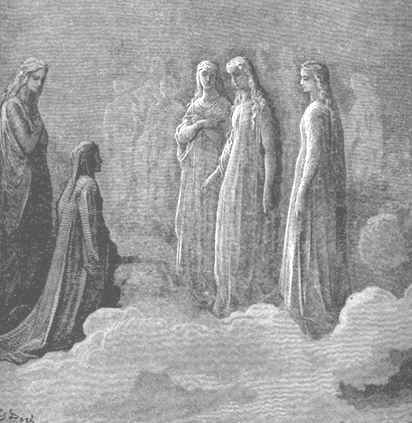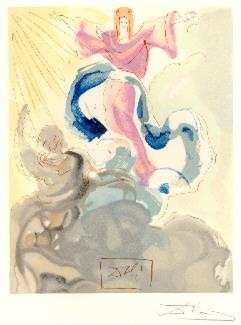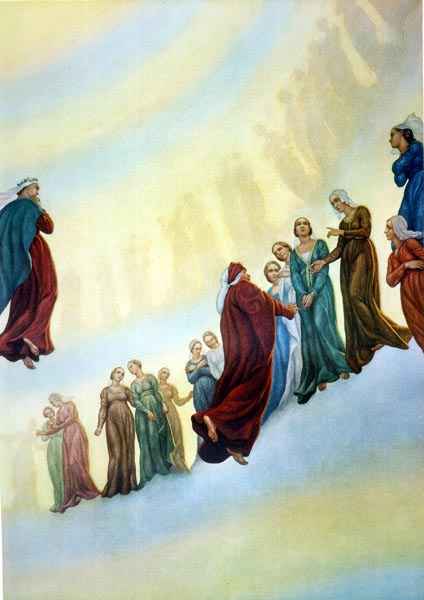 |
 |
 |
|
|
|
|
 |
 |
 |
|
|
|
|
| PAR03 |
|
|
|
|
| ........... | ....... G.GUAITA |
................................. H.W.LONGFELLOW |
...... .D.ALIGHIERI |
....... ... | ....... |
| 1
|
Cul
sul
che
a
'l
prim amùr l'àva scaudàmi, bén razunànd, 'd na bèla verità l'àva la lùce ciàra rivelàmi. |
That
Sun, which erst with love my bosom warmed, Of beauteous truth had unto me discovered, By proving and reproving, the sweet aspect. And, that I might
confess
myself convinced But there
appeared a vision,
which withdrew me |
Quel
sol
che
pria
d'amor mi scaldò 'l petto, di bella verità m'avea scoverto, provando e riprovando, il dolce aspetto; |
| 4
|
E
par
dìji
che
mi
fòra dl' erùr dès iéra tant cuntént e persüàs, già iéra lì par tirè sü la tèsta; |
e io, per
confessar
corretto e certo me stesso, tanto quanto si convenne leva' il capo a proferer più erto; |
|
| 7
|
ma
na viziòn a mi dès am cumpàr che strëta a tén a lé la mè l'atensiòn, e 'd dìmi adès sicür iù nén vizàmi. |
ma
visione apparve
che ritenne a sé me tanto stretto, per vedersi, che di mia confession non mi sovvenne. |
|
| 10
|
Mè
'n
védar
trasparént
e
bén pulìt, o ànche an àqui lìquidi e tranquìli, dl'autësa che 'ncù 's pöl s'ciarèsi 'l fond, |
Such
as through polished and transparent glass, Or waters crystalline and undisturbed, But not so deep as that their bed be lost, Come back again
the outlines
of our faces Such saw I many
faces prompt
to speak, |
Quali per
vetri trasparenti
e tersi, o ver per acque nitide e tranquille, non sì profonde che i fondi sien persi, |
| 13
|
's
riflètu
di
parsòn'i
i
lineamént, tant débuj mè che apén'a vëdi 's pöl na pèrla da urnamént 's na biànca front, |
tornan
d'i nostri
visi le postille debili sì, che perla in bianca fronte non vien men forte a le nostre pupille; |
|
| 16
|
cuzì
di
fàci
am
vëd
a parlè prònti, tant che 'ntl'ingàn cuntràri i casc a cul che l'éra capità tra l'àqua e l'om. |
tali
vid'io più
facce a parlar pronte; per ch'io dentro a l'error contrario corsi a quel ch'accese amor tra l'omo e 'l fonte. |
|
| 19
|
Sübit
che
iù
'ncurgìmni
mi
ad lur, cardénd che i füisu efèt di 'n quài riflès, par vëdi ad chi ca i füisu am gir andré; |
As
soon as I became aware of them, Esteeming them as mirrored semblances, To see of whom they were, mine eyes I turned, And nothing saw,
and once
more turned them forward "Marvel thou
not," she said
to me, "because |
Sùbito sì
com'io di lor m'accorsi, quelle stimando specchiati sembianti, per veder di cui fosser, li occhi torsi; |
| 22
|
ma
niénte
i
vëd;
e
alùra tùrna i öc' iù fisà drit an cuj dla càra guìda, che vdìva lì surìdi cun i öc' sant. |
e nulla
vidi, e ritorsili
avanti dritti nel lume de la dolce guida, che, sorridendo, ardea ne li occhi santi. |
|
| 25
|
"Se
mi
i
surìd,
ansün'a
maravìa - m dis - par al to pensé da maznà cit, parchè i to pé 'nsal vér pòzu 'ncù nén, |
«Non ti maravigliar
perch'io sorrida», mi disse, «appresso il tuo pueril coto, poi sopra 'l vero ancor lo piè non fida, |
|
| 28
|
ma
't
cuntìnui
a
girèti
sémp a vöid: ànimi véri ién cùli che ti 't vëdi, chi cunfinà pr'avéi mancà a 'l so vut. |
But
turns thee, as 'tis wont, on emptiness. True substances are these which thou beholdest, Here relegate for breaking of some vow. Therefore speak
with them,
listen and believe; And I unto the
shade that
seemed most wishful |
ma te
rivolve, come
suole, a vòto: vere sustanze son ciò che tu vedi, qui rilegate per manco di voto. |
| 31
|
Pàrla
cun
lur
e
crëd
a lònche 't dìzu; la lùce 'd verità che iàn andrén ai parmët nén d'andè luntàn da lé". |
Però parla
con esse e odi e credi; ché la verace luce che li appaga da sé non lascia lor torcer li piedi». |
|
| 34
|
E
mi
a
l'òmbra
che
püsè ma zmiàva füisa dispòsta a razunè, i cumìnc' quàzi mè iün che 'l mor a dla gran vòja: |
E io a
l'ombra che
parea più vaga di ragionar, drizza'mi, e cominciai, quasi com'uom cui troppa voglia smaga: |
|
| 37
|
"O
spìrit
bén
creà
che
'd vìta etèrna i rag' dla cuntantësa 't sénti, che crëdi ancù 's pöl nén se nén pruvàndla, |
"O
well-created spirit, who in the rays Of life eternal dost the sweetness taste Which being untasted ne'er is comprehended, Grateful 'twill
be to me,
if thou content me "Our charity doth
never shut
the doors |
«O
ben creato
spirito, che a' rai di vita etterna la dolcezza senti che, non gustata, non s'intende mai, |
| 40
|
an
gran
piezì
tam
fè
se ti tam dìzi al to nom e la vòsa cundisiòn". E cùla prònta e cun i öc' ridént: |
grazioso
mi fia se
mi contenti del nome tuo e de la vostra sorte». Ond'ella, pronta e con occhi ridenti: |
|
| 43
|
"L'amùr
che
iùma
nùi
ansün'a
pòrta al sèra a giüsta vòia, cunfùrm a cul che 'l völ uguàl a lü 'nche i àuti tüti. |
«La
nostra
carità non serra porte a giusta voglia, se non come quella che vuol simile a sé tutta sua corte. |
|
| 46
|
Surèla
'n
Crist
iù
stàta
sü 'ntal mond; e se ti cun la mént at cèrchi bén, ma scundrà nén a ti l'èsi pü bèla, |
I
was a virgin sister in the world; And if thy mind doth contemplate me well, The being more fair will not conceal me from thee, But thou shalt
recognise
I am Piccarda, All our
affections, that
alone inflamed |
I' fui
nel mondo
vergine sorella; e se la mente tua ben sé riguarda, non mi ti celerà l'esser più bella, |
| 49
|
ma
ti
't
ricunusrè
che
i son Picarda, che, 't vëdi, esend mi chi cun si beati, beata i son cun lur 'ntal cél pü bas. |
ma
riconoscerai ch'i'
son Piccarda, che, posta qui con questi altri beati, beata sono in la spera più tarda. |
|
| 52
|
I
nos
afèt
che
mèc
a iàn piazì d'èsi cunfùrm a cuj dla Spìrit Sant, adl'ùrdin ién cuntént andùa ia stan; |
Li nostri
affetti,
che solo infiammati son nel piacer de lo Spirito Santo, letizian del suo ordine formati. |
|
| 55
|
e
a
nùi
sa
sort
che pöl zmiè tant bàsa, iàn dànla parchè i vut che iàvu fat, iùma nén uservài mè 's düvìva". |
And
this allotment, which appears so low, Therefore is given us, because our vows Have been neglected and in some part void." Whence I to her:
"In your
miraculous aspects Therefore I was
not swift
in my remembrance; |
E questa
sorte che
par giù cotanto, però n'è data, perché fuor negletti li nostri voti, e vòti in alcun canto». |
| 58
|
E
mi
a
lé:"An
tüti
i vos aspèt quaicòs risplénd, an 'su nén che' 'd divìn che 'v fa cambiè da mè che iéri prìma; |
Ond'io a
lei: «Ne'
mirabili aspetti vostri risplende non so che divino che vi trasmuta da' primi concetti: |
|
| 61
|
par
sa
razòn
mi
iù
stantà a cunòsti, ma adès am iüta lònche ti t'è dìmi, e pü fàcil par mi l'è ricunòsti. |
però non fui
a rimembrar festino; ma or m'aiuta ciò che tu mi dici, sì che raffigurar m'è più latino. |
|
| 64
|
Vuj,
dìmi,
che
chi
dès
i séi cuntént, vurìi nén 'nti 'n post pü aut truvèvi par vëdi pü prufònd e avéj pü amìs?". |
But
tell me, ye who in this place are happy, Are you desirous of a higher place, To see more or to make yourselves more friends?" First with those
other shades
she smiled a little; "Brother, our
will is quieted
by virtue |
Ma dimmi:
voi che
siete qui felici, disiderate voi più alto loco per più vedere e per più farvi amici?». |
| 67
|
An
poc
l'ha
suridì
cun
i àuti òmbri; e pö 'm rispònd tant pién'a 'd cuntantësa, che spléndi zmiàva 'n lé 'l prim föc d' amùr: |
Con
quelle altr'ombre
pria sorrise un poco; da indi mi rispuose tanto lieta, ch'arder parea d'amor nel primo foco: |
|
| 70
|
"O
fratèl
car,
la
nòsa
vuluntà lu pàzia cul Amùr che 'n fa vuléi mèc cul che iùma, e d'àut iùma nén séj. |
«Frate, la
nostra volontà quieta virtù di carità, che fa volerne sol quel ch'avemo, e d'altro non ci asseta. |
|
| 73
|
Se
i
vuléisu
nuj
èsi
püsè 'n àut i andrìu nén d'acòrdi i dezidéri cun lònche 'l völ chi bèli chi 'n destìn'a: |
If
to be more exalted we aspired, Discordant would our aspirations be Unto the will of Him who here secludes us; Which thou shalt
see finds
no place in these circles, Nay, 'tis
essential to this
blest existence |
Se
disiassimo esser
più superne, foran discordi li nostri disiri dal voler di colui che qui ne cerne; |
| 76
|
l'è
lònche
'l
pöl
ne
èsi 'nti si céi, parchè chi, 'mpòrta mèc vuléisi bén; l'è cùsta la natüra 'd carità. |
che
vedrai non capere
in questi giri, s'essere in carità è qui necesse, e se la sua natura ben rimiri. |
|
| 79
|
Par
èsi
nuj
beàti
l'è
esensiàl ca 's tén'u 'ndrén la vuluntà divìn'a, che a tüti 'n fa vuléi la stèsa ròba: |
Anzi
è formale
ad esto beato esse tenersi dentro a la divina voglia, per ch'una fansi nostre voglie stesse; |
|
| 82
|
e
mè
i
sùma
rangià
da l'àut al bas par tüt al rëgn, a tüt al rëgn i piàs, mè i piàs a 'l rè che 'n völ cunfùrm a lü. |
So
that, as we are station above station Throughout this realm, to all the realm 'tis pleasing, As to the King, who makes his will our will. And his will is
our peace;
this is the sea Then it was clear
to me how
everywhere |
sì
che, come
noi sem di soglia in soglia per questo regno, a tutto il regno piace com'a lo re che 'n suo voler ne 'nvoglia. |
| 85
|
L'è
la
so
vuluntà
la
nòsa pas; l'è lé cul mar andùa tüt ai va lònche la créa e che natüra fa". |
E 'n la
sua volontade
è nostra pace: ell'è quel mare al qual tutto si move ciò ch'ella cria o che natura face». |
|
| 88
|
Alùra
l'è
stat
ciàr
mè
'n tüti i post an cél l'è paradìs; se bén la gràsia dal gran Bén i piöv nén a na manéra. |
Chiaro mi
fu allor
come ogne dove in cielo è paradiso, etsi la grazia del sommo ben d'un modo non vi piove. |
|
| 91
|
Ma
mè
quànd
mangiùma,
'n
bàsta na ròba e 'd n'àuta 'nvéce 'n rèsta ancù la vòja, che 'd iün'a i ringrasiùma e l'àuta as ciàma, |
But
as it comes to pass, if one food sates, And for another still remains the longing, We ask for this, and that decline with thanks, E'en thus did I;
with gesture
and with word, "A perfect life
and merit
high in-heaven |
Ma
sì com'elli
avvien, s'un cibo sazia e d'un altro rimane ancor la gola, che quel si chere e di quel si ringrazia, |
| 94
|
'nche
mi
iù
fat
cun
gèst e cun paròli, par fèmi dì da lé che téila füisa che l'àva nén pudü' purtè a la fin. |
così fec'io
con atto e con parola, per apprender da lei qual fu la tela onde non trasse infino a co la spuola. |
|
| 97
|
"
'D
perfèta
vìta
e
'd mérit grand, pü sü, na dòna - 'm dis - a iè, e a la so nòrma, giü 'ntal vos mond as pìa la vèsta e 'l vél, |
«Perfetta vita
e alto merto inciela donna più sù», mi disse, «a la cui norma nel vostro mondo giù si veste e vela, |
|
| 100
|
parchè
fìn'a
a
la
mort
as vìva e 's dòrma cun cul a spus che ògni vut acèta che al so piazì l'amùr al fa cunfùrm. |
That
until death they may both watch and sleep Beside that Spouse who every vow accepts Which charity conformeth to his pleasure. To follow her, in
girlhood
from the world Then men
accustomed unto
evil more |
perché fino
al morir si vegghi e dorma con quello sposo ch'ogne voto accetta che caritate a suo piacer conforma. |
| 103
|
Dal
mond
mi,
ancù
maznà,
pr'andèi près, 'm ritìr, par arparèmi sùta 'l vél, e fedeltà a la régula i prumët. |
Dal
mondo, per seguirla,
giovinetta fuggi'mi, e nel suo abito mi chiusi e promisi la via de la sua setta. |
|
| 106
|
Pö
di
òmni
sòlit
fè
pü 'l mal che 'l bén, ién vnì tirèmi fòra dal cunvént; che vìta iù duvì fè, lu sa 'l Signùr. |
Uomini
poi, a mal
più ch'a bene usi, fuor mi rapiron de la dolce chiostra: Iddio si sa qual poi mia vita fusi. |
|
| 109
|
E
s'àut
splendùr
che
't
vëdi a la me drìta che l'è visc andrén 'd tüta la lùce dal cél dla lün'a 'ndùa i sùma dès, |
This
other splendour, which to thee reveals Itself on my right side, and is enkindled With all the illumination of our sphere, What of myself I
say applies
to her; But when she too
was to the
world returned |
E
quest'altro splendor
che ti si mostra da la mia destra parte e che s'accende di tutto il lume de la spera nostra, |
| 112
|
lònche
mi
i
dis
ad
mi, va bén par lé; suòra ànche lé, gavài iàn da 'n tèsta cul vél che i dàva sàcra prutesiòn. |
ciò ch'io
dico di me, di sé intende; sorella fu, e così le fu tolta di capo l'ombra de le sacre bende. |
|
| 115
|
Ma
ànche
quànd
ién
fàla
entrè 'ntal mond còntra la vuluntà e 'l bon custüm, antal cör l'è rastà fedél al vél. |
Ma poi
che pur al
mondo fu rivolta contra suo grado e contra buona usanza, non fu dal vel del cor già mai disciolta. |
|
| 118
|
Cùsta
la
lùce
l'è
dla
gran Custànsa che da 'l secònd imperatùr da Zvévia, al tèrs l'ha generà, l'ültim dla cà". |
Of
great Costanza this is the effulgence, Who from the second wind of Suabia Brought forth the third and latest puissance." Thus unto me she
spake, and
then began My sight, that
followed her
as long a time |
Quest'è la
luce de la gran Costanza che del secondo vento di Soave generò 'l terzo e l'ultima possanza». |
| 121
|
Cuzì
lé;
pö
'Ave
-
cantànd - Marìa' sémp pü luntàn andànd la scumparìva mè 'ntl'àqua la va a fond dla ròba gréva. |
Così parlommi,
e poi cominciò 'Ave, Maria cantando, e cantando vanio come per acqua cupa cosa grave. |
|
| 124
|
Pü
che
i
pudìva
mi
cun la mè vìsta iù 'ndài près; e quànd che iù pardìla, a 'l mè pü grand ad tüti i dezidéri, |
La vista
mia, che
tanto lei seguio quanto possibil fu, poi che la perse, volsesi al segno di maggior disio, |
|
| 127
|
a
Beatrìs
am
gir;
e
lé cun i öc' mè na luznà d'amùr a lè mandàmi, tant da scunfòndi sübit la mè vìsta: |
And
wholly unto Beatrice reverted; But she such lightnings flashed into mine eyes, That at the first my sight endured it not; And this in questioning more backward made me. |
e a
Beatrice tutta
si converse; ma quella folgorò nel mio sguardo sì che da prima il viso non sofferse; |
| 130 | e cust l'ha ritardà la mè dumànda. | e ciò mi fece a dimandar più tardo. |